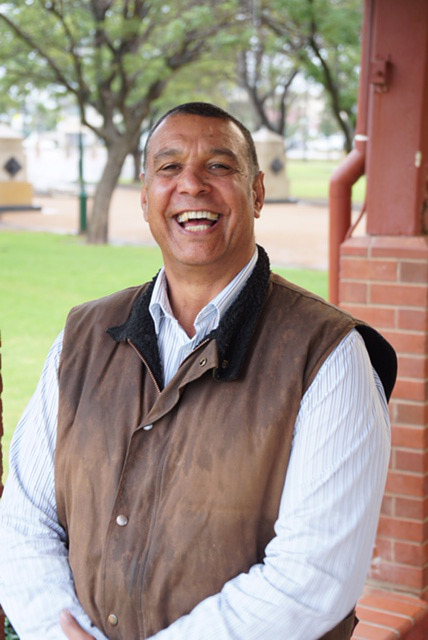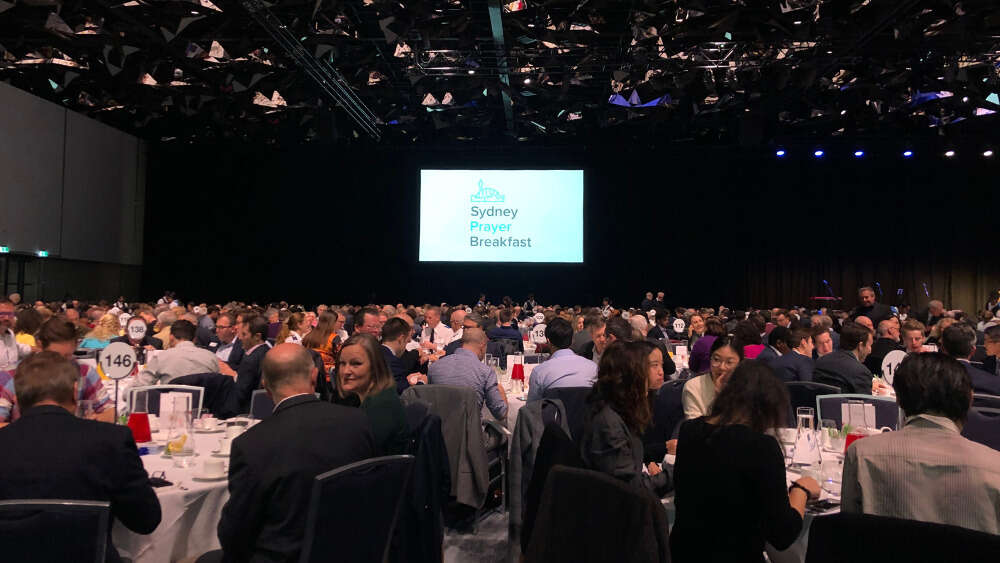Attendees of the Sydney Prayer Breakfast this morning stood to their feet and gave a rousing standing ovation for the event’s keynote speaker, Peter Gibbs. Gibbs is a Gamillaroi man from the community of Weilmoringle in far west NSW and the founder of IPROWD – a training model that develops Aboriginal people for a potential career in the NSW Police Force.
The 1,700 strong crowd had fellowshipped, eaten and been led in worship by Emu Music. They had been corporately led by Smith’s Hill high school student Annabelle Meek, Robert Knight, Amy Brown, Jacob Sarkodee, Chris Minns (MP) and Deb Magill – and in small groups. And all before 8am!
Yet, you could have heard a pin drop in the packed room as an emotional Gibbs began to share his story.
“Friends, I think we’ve all had an opportunity in our life to come to a T-intersection – about whether we go down this track or whether we go down that track,” he said. “My T-intersection came in 1997 when my sister Fiona died in police custody in our little hometown Brewarrina, in the northwest of NSW,” he said.
“I had no idea what Nan was talking about until my sister died in police custody.” – Peter Gibbs
Brewarrina, he explained, is a small town of only a couple of thousand people. “Predominantly Aboriginal. Predominantly families of mine.”
“So when I was struck with the news that my sister had been killed in police custody in Brewarrina in the middle of the day, the shock that I felt that day still resonates with me today,” he said.
“What I’m up here today sharing with you is the testimony that started with Fiona’s death. It has given me the opportunity, on the back of her tragedy, to come and share with you the changes in my life that I need to make – to assist Aboriginal people, prevent Aboriginal deaths in custody, and, more importantly, to follow Christ.”
Gibbs told the crowd that he had grown up with his grandmother telling him, “Son, you are going to be a leader in your community.”
“I had no idea what Nan was talking about until my sister died in police custody,” he told the captivated crowd. “Jolted to the front to make important decisions on behalf of her community … I was jolted to the front in leadership. I made a decision with my dad there would no violence, there would be no repercussions on our police force – there would be nothing inflicted on the little community we loved because of the tragedy of losing my sister.”
After researching Aboriginal deaths in custody, Gibbs learned that more Aboriginal people were needed in the police force. He connected with then State Police Commissioner Andrew Scipione and launched the first pilot program of the IPROWD program in NSW.
“It’s tough, but I’d rather be serving Jesus.” – Peter Gibbs
Fifteen year later, the program has trained many Aboriginal people who have taken their rightful place in the NSW police stations serving our community.
“What better classroom [than] to have an Aboriginal and non-Aboriginal police officer sitting in police truck travelling around the community and getting lessons from each other about how you deal with people – and that maybe locking them up isn’t the answer. Maybe building relationship is, building understanding, especial cultural understanding … Because with Aboriginal incarceration rates going up … we need a better response.”
Through the process, Gibbs also learned about himself and the Christian legacy of his family. His mum, who had died at 28, had been a Christian. His grandmother and his Aunty and Uncle were also Christians.
One night, Gibbs was planning to end his life because the weight of life’s burdens and the unforgiveness he was carrying had become too heavy to bear.

Sydney Prayer Breakfast 2022 keynote speaker, Peter Gibbs.
“I didn’t understand forgiveness. I had to forgive NSW Police,” he said. “How can you hold that burden on your shoulders and in your heart for the rest of your life? That’s why I was choosing suicide.”
But instead, he turned to God and said, “I will be that leader you are calling me to be. I will be that leader my Nan told me about.” A few days later, he drove out to his Aunty and Uncle’s church in Bourke and formally surrendered his life to the Lord.
The Christian life isn’t roses, he said. “It’s tough, but I’d rather be serving Jesus.”
He told the grandmothers in the crowd, “Don’t stop praying for your little fellas. I’m a living example of a grandmother who wouldn’t give up … I wish she would have lived a few extra years and seen me. But one day we will meet again.”
“I don’t want to be a burden on you,” he said. “I just want you to be encouraged that we need you to stand alongside us. Thank you for giving me an opportunity in Reconciliation Week to encourage you. Bless you.”
Email This Story
Why not send this to a friend?



